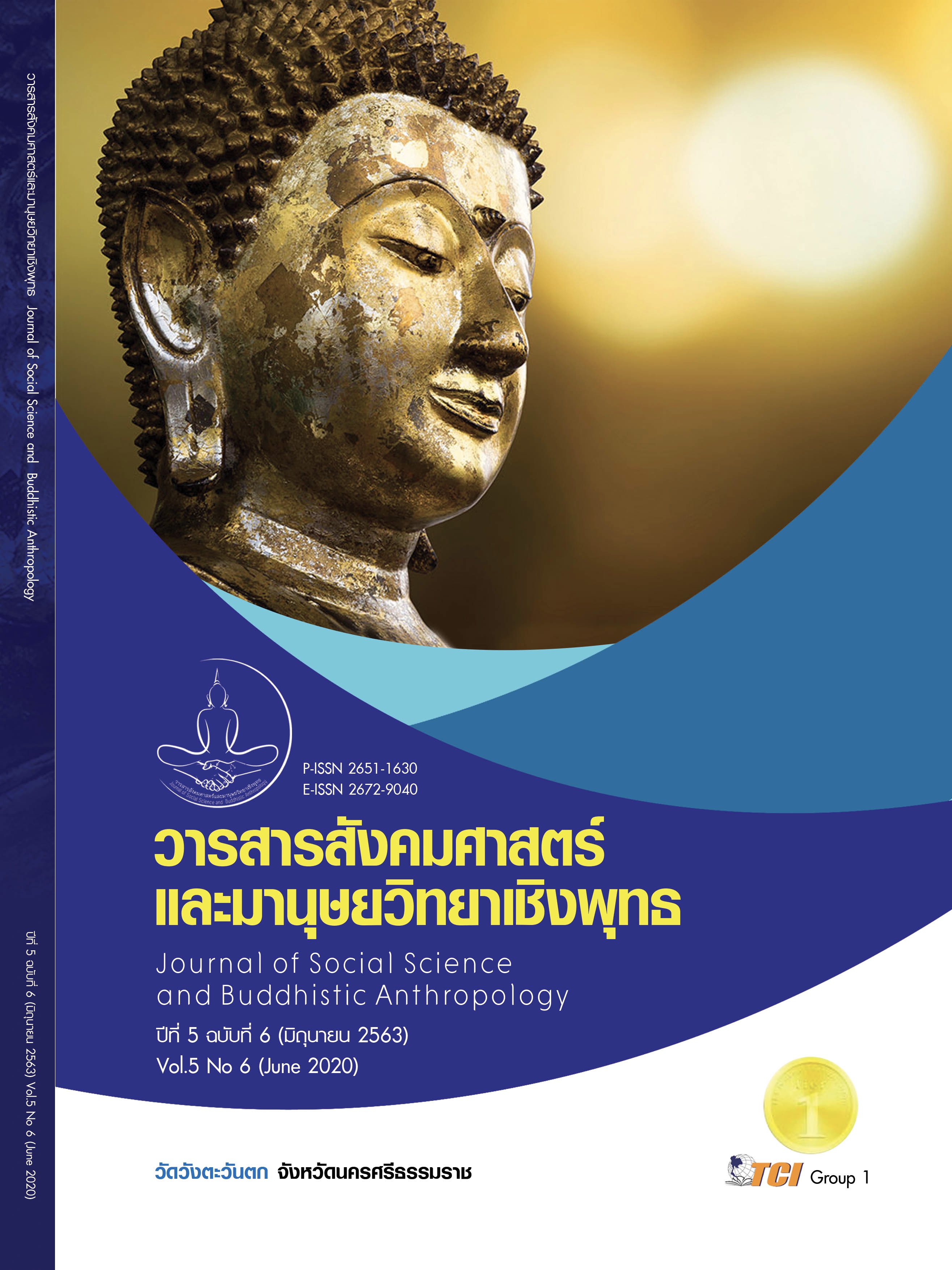GUIDELINE FOR APPLYING BUDDHIST AND POSTMODERN PHILOSOPHY IN THE DEVELOPMENT OF BUDDHIST TOURISM IN SONGKHLA PROVINCE
Keywords:
Buddhist Philosophy, Postmodern Philosophy, Buddhist TourismAbstract
The objectives of this article were as follows: 1) to study the concept of Buddhist tourism in Songkhla Province, 2) to study the Buddhist and Postmodern philosophy on religious tourism, 3) to use the Buddhist philosophy and postmodern philosophy as a guideline for applying in the development of Buddhist tourism in Songkhla province, 4) to create a new body of knowledge and a model for the development of Buddhism tourism. This research was a qualitative research by document studies and field studies present the research results by a descriptive method. The results of the research were found as follows: The concept of Buddhist tourism in Songkhla province. It is a form of tourism that aims to provide tourists with diverse experience for relaxation and good deeds affecting the quality of life and both physically and mentally. Buddhist and Postmodern philosophy on religious tourism, It consists of the principles of Buddhist metaphysics (Khan 5), Buddhist Epistemology (Panya 2), Buddhist ethics (Noble Eightfold Path), Buddhist Morality (4 powers) and Buddhist Aesthetics (7 things favorable to mental development), and Postmodern philosophical concepts of Michel Foucault, especially the concepts of marketing technology. Using Buddhist and Postmodern philosophy as a guideline for applying in the development of Buddhist tourism in Songkhla province, it can be applied in 8 parts, namely, resources, tourism landscape management, cooperation (government, temples, and communities), personnel, facilities, stores/souvenir items, information, and public relations. It is a new body of knowledge and model guidelines for the development of Buddhist tourism. It is a new body of knowledge for the development of Buddhism tourism under the "LVW-BDTI" model.
References
ฉลองศรี พิมลสมพงศ์. (2550). การวางแผนและพัฒนาตลาดการท่องเที่ยว. กรุงเทพมหานคร: มหาวิทยาลัยเกษตรศาสตร์.
ชนัญ วงษ์วิภาค และคณะ. (2547). การจัดการทรัพยากรทางวัฒนธรรมเพื่อการท่องเที่ยวอย่างยั่งยืน. ใน วิทยานิพนธ์โบราณคดีมหาบัณฑิต สาขาวิชามานุษยวิทยา. มหาวิทยาลัยศิลปากร.
เทิดชาย ช่วยบำรุง. (2550). ก้าวต่อไป...การท่องเที่ยวไทยในเวทีอาเซียน. กรุงเทพมหานคร: สำนักงานประสานงานการพัฒนาและจัดการการท่องเที่ยวเชิงพื้นที่อย่างยั่งยืน สำนักงานกองทุนสนับสนุนการวิจัย (สกว.).
บุษกร ถาวรประสิทธิ์. (2559). แนวทางการพัฒนาการท่องเที่ยวเชิงพุทธในจังหวัดสงขลา. สงขลา: มหาวิทยาลัยทักษิณ.
ประวิทย์ เฮงพระธานี. (2561). การจัดการท่องเที่ยวเชิงพุทธของวัดในจังหวัดขอนแก่น. ใน ดุษฎีนิพนธ์พุทธศาสตรดุษฎีบัณฑิต สาขาวิชาพระพุทธศาสนา. มหาวิทยาลัยมหาจุฬาลงกรณราชวิทยาลัย.
พันธ์ทิพา ณ พัทลุง. (2550). โครงการตำราเฉลิมพระเกียรติเนื่องในวโรกาสพระบาทสมเด็จพระเจ้าอยู่หัว พระชนมพรรษาครบ 80 พรรษา. ฉะเชิงเทรา: มหาวิทยาลัยราชภัฎราชนครินทร์.
ภัทร์สุภา ลีลานภาพรรณ์. (2551). การท่องเที่ยวเชิงพุทธ : ศึกษาเฉพาะกรณีแหล่งวัฒนธรรมในกรุงเทพมหานคร. ใน สารนิพนธ์ศาสนศาสตรมหาบัณฑิต สาขาวิชาพุทธศาสน์ศึกษา. มหาวิทยาลัยมหามกุฏราชวิทยาลัย.
ศิริภัทรา รักษาพล. (2559). บทบาทของวัดประยุรวงศาวาสวรวิหารในการส่งเสริมการท่องเที่ยวชุมชนพหุวัฒนธรรมตามหลักพุทธสันติวิธี. ใน วิทยานิพนธ์พุทธศาสตรมหาบัณฑิต สาขาวิชาสันติศึกษา. มหาวิทยาลัยมหาจุฬาลงกรณราชวิทยาลัย.
ศุภลักษณ์ อัครางกูร. (2551). พฤติกรรมนักท่องเที่ยว. ขอนแก่น: คลังนานาวิทยา.
สันติชัย เอื้อจงประสิทธิ์. (2549). การบริหารการท่องเที่ยวเชิงกลยุทธ์. กรุงเทพมหานคร: บริษัท นวตสาร จำกัด.









